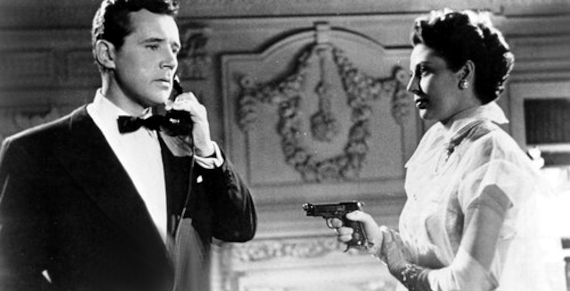« Farewell | Main | Man's Favorite Sport? »
March 29, 2022
Shakedown

Joe Pevney - 1950
KL Studio Classics BD Region A
One of the couple of virtues to Joseph Pevney's debut feature is that it cuts to the chase immediately. No padding with introductory exposition. Howard Duff is chased by three thugs in a railroad yard. Duff hides his camera near the underside of a train and then continues to run. The thugs catch up with him. Duff has tossed his camera case into the bay which the thugs do not realize is empty. After being punched several times, Duff is left sprawled on the rail tracks with barely enough strength to drag himself away from an oncoming train.
Shakedown has a running time of eighty minutes, and a cast of Universal contract players and stars who found more work in television. The film was probably made primarily to serve as a second feature in urban theaters or as something for smaller theaters to run at a time when a movie might be given an engagement of two or three days. The cast is made up of recognizable names with actors who's careers either saw a descent in the case of Brian Donlevy, or who had plateaued to a certain level, which had happened wth Duff, Lawrence Tierney and Bruce Bennett. Actress Peggy Dow retired from acting within a couple of years while Anne Vernon returned to a long, rewarding career primarily in her native France. Universal cut some financial corners by recycling excerpts from the scores of previous releases. There is also a blink or you will miss it appearance by an uncredited Rock Hudson. Peggy Dow noted in an interview that she also had to supply her own wardrobe. The studio did have enough confidence in Pevney to allow for some location shooting in San Francisco that is thankfully devoid of tourist eye establishing shots save for a brief pan of the Golden Gate Bridge.
Duff, as Jack Early, recovers his camera and uses in an incriminating photograph as his calling card to get on the staff of a newspaper. He convinces photo editor Ellen Bennett and editor David Glover to allow him to work provisionally when Early manages to take a photo of a man who drove his car off a pier. Early wants to be a professional photographer in the worst way possible. After talking a camera shy reputed gangster into posing for him, Early starts scheming ways to use his photos to blackmail the gangster and his rival. In addition to his desire for money and celebrity, Early sees himself as a lady's man, forcing his attentions on Ellen and Nita, the wife of the gangster with the respectable front. Without belaboring the point, Early has a sharp sense of perspective behind the camera, but not in terms of looking at himself.
Jason Ney's commentary track compares Jack Early to the legendary Arthur "Weegee" Fellig, using quotes from Fellig's autobiography. The big difference is that Fellig may have used devious methods at time to get his shots, but he also had a sense of ethics that Early lacks. Also in connecting Shakedown to the film noir canon, Ney points out that co-screenwriter wrote the original story for Detour as well as having a hand in The Narrow Margin. Ney also relays how Joseph Pevney was able to move from being one of Universal's contract supporting players to being given the chance to direct, with a modestly budgeted film that represented a small gamble on the part of the studio. Pevney's direction might be best described as functional. For those who grew up watching movies, sometimes indiscriminately, on late night broadcast television, Shakedown is the kind of film that might appear after midnight, with commercial interruptions, still fitting perfectly into a ninety minute slot.
Posted by Peter Nellhaus at March 29, 2022 08:02 AM
